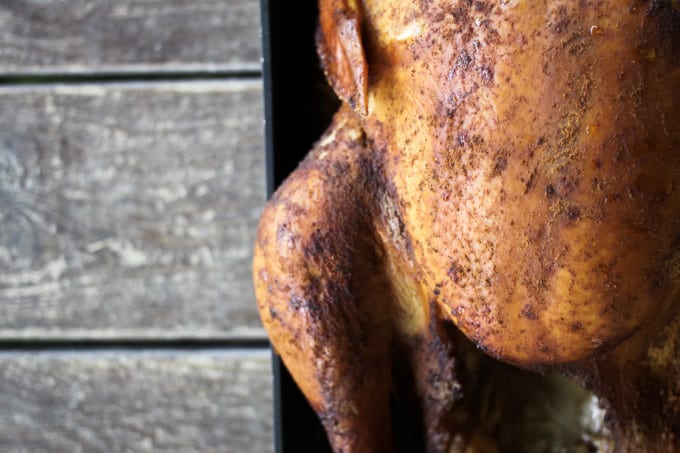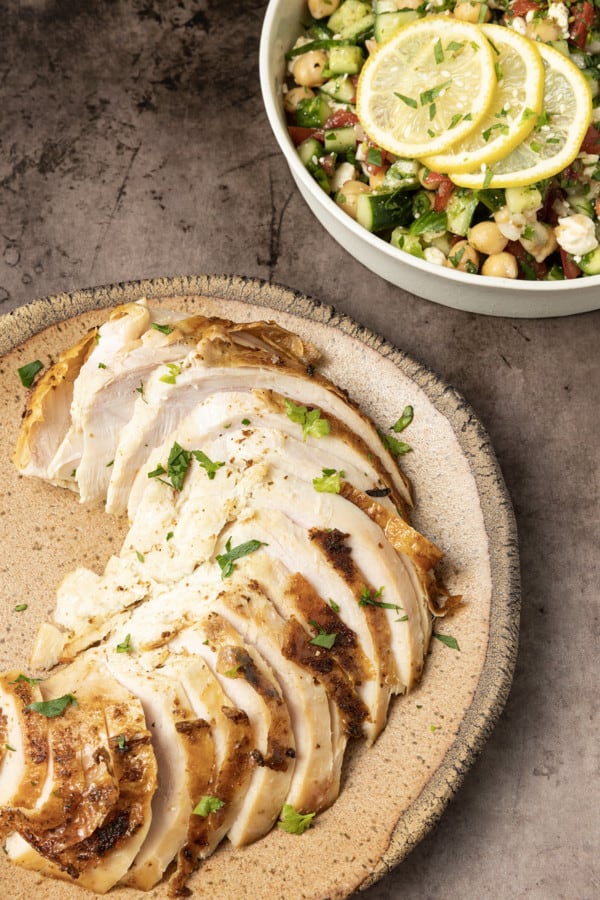If you’ve always wanted to smoke your own turkey, this tutorial will show you how easy it can be to make the best turkey you’ve ever had!
Not only will this be the best smoked turkey you’ve ever had, but it will also be the best Thanksgiving turkey you’ve ever tasted. Get ready for a Thanksgiving dinner that will wow!.
Smoked Turkeys have something of a mystique surrounding them. Eight weeks before Thanksgiving, people swarm to a nearby store to order smoked turkeys for their Thanksgiving feast.
Everyone in these parts agrees that smoked turkeys are where it’s at flavour and texture-wise. I’m not sure why so few people try to smoke themselves, considering how easy and forgiving the process is.
The truth is that you’re far, FAR more likely to render a turkey inedibly dry when roasting it. Think of Clark Griswold’s sister-in-law on ‘National Lampoon’s Christmas Vacation’. Remember how that thing was turkey jerky?.
A juicy, flavorful smoked turkey is the centerpiece of many Thanksgiving celebrations But how do you achieve that perfect balance of moist meat and crispy skin? Should you wrap your turkey in foil while smoking?
The answer is a resounding no. Although it might seem sensible to wrap your turkey in foil to keep it moist, doing so actually slows down the smoking process and can cause soggy skin.
Here’s why wrapping your turkey in foil is a bad idea:
- Hinders Smoke Penetration: Foil acts as a barrier, preventing the smoke from reaching the turkey’s surface. This results in a less flavorful and smoky turkey.
- Promotes Soggy Skin: Wrapping your turkey in foil traps moisture, leading to soggy skin instead of the desired crispy texture.
- Slows Down Cooking: Foil insulation can slow down the cooking process, making it difficult to achieve the desired internal temperature.
For a perfectly smoked turkey, use these tips rather than wrapping it in foil:
- Brine the Turkey: Brining helps to keep the turkey moist and flavorful.
- Spatchcock the Turkey: Spatchcocking involves removing the backbone and flattening the turkey, allowing for more even cooking and faster cook times.
- Maintain a Consistent Temperature: Aim for a smoker temperature between 225°F and 250°F throughout the cooking process.
- Use a Meat Thermometer: Monitor the internal temperature of the turkey, ensuring it reaches 160°F in the breast and 165°F in the thigh.
- Rest the Turkey: Let the turkey rest for 30 minutes after smoking to allow the juices to redistribute.
Bonus Tip: If you’re worried about the turkey drying out, you can baste it with butter or oil during the last 30 minutes of smoking.
Here are some additional frequently asked questions about smoking turkey:
- How long does it take to smoke a turkey? The general rule is 11-12 minutes per pound of turkey. So, a 12-pound turkey will take approximately 2-3 hours to smoke.
- How do you keep a turkey moist when smoking? Brining and spatchcocking are the best ways to keep your turkey moist.
- What’s the best wood to smoke turkey? Hickory or apple wood are preferred for their mild flavor that complements the turkey.
- What’s the best temperature to smoke turkey? Aim for a temperature between 220°F and 225°F.
By following these tips, you can achieve a perfectly smoked turkey that is both juicy and flavorful. So ditch the foil and get ready to impress your guests with your culinary skills!
What Temp to Smoke a Turkey
Now is a great time to share a list of the supplies you’ll need to smoke a turkey, since the smoker will determine how easily you maintain your temperature. And I’m happy to say you have options!.
- A smoker with a thermostat so you can set and maintain the desired temperature
- A Roaster pan or drip pan for your smoker.
- wood chips, pellets, or briquettes, depending on the type of smoker you use
Obviously, a proper smoker is going to make this job FAR easier, but it can most certainly be done in a grill with a very low indirect heat. You’re going for 225°F to 250°F. If you have a real deal smoker with an adjustable thermostat, please set it at 250°F for the duration.
We really need to talk about the kind of wood smoke we’re using because I only use apple or alder wood for my turkeys.
It’s readily available (at least in this literal and figurative neck of the woods), and I think it’s mildly flavorful. ) If you wanted a good second choice, I think hickory would be excellent, too. I’d be less likely to go for mesquite, but it wouldn’t be bad.

I used to use a dedicated smoker, but these days, I use my handy-dandy, trusty Traeger pellet grill for the job. It’s insulated, it maintains temperature as easily as an oven, and it has a hopper I can fill with convenient wood pellets.
It takes all of the work out of smoking any number of proteins. Bonus: I can order my Traeger pellets to be shipped monthly from Amazon via the subscribe and save feature.
You can use the same types of wood with good results if your smoker uses wood chips. Just follow the smoker manufacturer’s instructions to maintain approximately 250ºF.
You can smoke your turkey directly on the smoker’s grates with a drip tray underneath, or you can smoke it in a roasting pan on a rack. I like to use the roasting pan because I like to collect the turkey drippings for gravy or roasted potatoes.
If cooking the turkey directly on the grates, please ensure that the drip pan does not contain an excessive amount of food. Turkeys give off a lot of liquid as they cook!.
Do I need to brine a turkey to smoke it?
My short answer is no. That said, you can certainly brine your turkey if you prefer it that way.
The longer version is that I don’t find brining to the worth the effort and mess it creates. While some swear by it, I think it’s an unnecessary effort added to something that’s already pretty tasty without it.
If you want the brining effect without the mess, you can dry brine the turkey by following the instructions in my post on smoked whole chicken. Just follow the instructions there, but size up in proportion to the weight of your turkey.
I know that people often brine their turkey because they’re afraid the roasting process will dry it out. The truth is that roasted turkey can often get a little dry.

